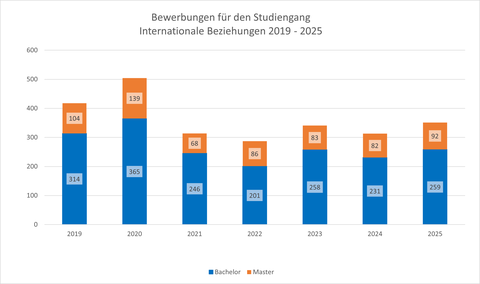Fragen und Antworten (FAQs)
Nein, ein Abiturschnitt von 1,0 ist keineswegs eine notwendige Voraussetzung für eine erfolgreiche Bewerbung.
Zwar ist der Abiturschnitt das mit Abstand wichtigste Einzelkriterium, aber die Tatsache, dass zahlreiche weitere Kriterien auch im schriftlichen Teil des Verfahrens berücksichtigt werden, ermöglicht in Abhängigkeit des jeweiligen jährlichen Bewerberfeldes stets die Möglichkeit, mit einem (sehr) guten Abitur zu den Auswahlgesprächen eingeladen zu werden und einen der begehrten Studienplätze zu erlangen. Umgekehrt garantiert ein Abiturschnitt von 1,0 in Abhängigkeit des jeweiligen Bewerberfeldes keineswegs die Einladung zum Auswahlgespräch geschweige denn eine insgesamt erfolgreiche Bewerbung.
Entsprechend den Zulassungsvoraussetzungen des Zentrums für Internationale Studien sind neben dem Abiturschnitt weitere Kriterien entscheidend, wie beispielsweise inner- und außerschulisches Engagement mit internationalem Bezug, Fremdsprachenkenntnisse sowie die Motivation des Studienbewerbers / der Studienbewerberin. Beachten Sie bitte, dass Sie die von Ihnen gemachten Angaben mit einem Nachweis belegen.
Ausführliche Hinweise zum Ablauf des Auswahlverfahrens finden Sie hier.
Das Auswahlverfahren für den Studiengang Internationale Beziehungen ist kein klassisches NC-Verfahren, da neben der Abiturdurchschnittsnote weitere Auswahlkriterien von Bedeutung sind (nähere Informationen entnehmen Sie bitte der Auswahlordnung). Allerdings kommt der Abiturdurchschnittsnote unter allen Kriterien das relativ stärkste Gewicht zu.
Der in der auf den Seiten des Immatrikulationsamtes veröffentlichten Tabelle zu NC-Grenzwerten grundständiger Studiengänge ausgewiesene NC von 1,0 bedeutet nicht, dass ein Abiturschnitt von 1,0 notwendige Voraussetzung für eine Bewerbung ist.
12% der Studienplätze werden in gesetzlich festgelegten Vorab-Quoten vergeben (Härtefälle, Zweitstudienbewerber:innen, Spitzensportler:innen, beruflich Qualifierte sowie ausländische Studienbewerber:innen [Nicht-EU]). Weiterhin werden Bewerber:innen zugelassen, die ihr STudium wegen eines Dienstes (z.B. FSJ) nicht antreten konnten (bevorzugte Zulassung).
Die verbliebenen Plätze werden wie folgt vergeben:
- 10% Abi-Besten
Die Vergabe erfolgt an die Bewerber:innen mit der besten Abitur-Durchschnittsnote. Bei Ranggleichheit entscheidet die Wartezeit bzw. ein Dienst (z.B. FSJ) - 10% Wartezeit
Die Vergabe erfolgt an die Bewerber:innen mit der längsten Wartezeit. Bei Ranggleichheit entscheidet die Abitur-Durchschnittsnote bzw. ein Dienst (z.B. FSJ) - 80% Auswahlverfahren der Hochschule
Ausführliche Hinweise zum Ablauf des Auswahlverfahrens finden Sie hier.
Die Auswahl der Studienbewerber:innen erfolgt aufgrund eines zweistufigen Auswahlverfahrens nach dem Grad der Eignung und der Motivation des Bewerbers für den Bachelorstudiengang „Internationale Beziehungen“.
In der ersten Stufe findet eine Vorauswahl der Bewerber:innen aufgrund der schriftlich eingereichten Unterlagen statt. Entscheidend für die Auswahl sind die Abiturdurchschnittsnote und zusätzliche Qualifikationen, die über die Eignung des Bewerbers / der Bewerberin Aufschluss geben. Hierzu zählen unter anderem Tätigkeiten mit internationalem Bezug, berufspraktische Tätigkeiten, Fremdsprachenkenntnisse, inner- und außerschulisches soziales und gesellschaftspolitisches Engagement, ehrenamtliche Tätigkeiten, Auslandsaufenthalte, Freiwilligendienste etc. Bitte denken Sie daran, alle Angaben mit entsprechenden Nachweisen zu belegen.
In der zweiten Stufe, dem persönlichen Auswahlgespräch, werden die Fähigkeiten des Bewerbers / der Bewerberin zum analytischen Denken und ausgeprägte Kenntnisse der aktuellen Entwicklungen in den internationalen Beziehungen geprüft. Zusätzlich sind die Kommunikationsfähigkeit und die Motivation des Studienbewerbers / der Studienbewerberin ausschlaggebend. Es werden sehr gute Kenntnisse der englischen Sprache und gute Kenntnisse in einer weiteren Sprache (Französisch oder Spanisch) vorausgesetzt. Wird für das Studium als Zweitsprache Russisch gewählt, werden keine Vorkenntnisse erwartet.
Folgende Unterlagen sind einzureichen:
- Hochschulzugangsberechtigung (Abiturzeugnis oder Äquivalent)
- tabellarischer Lebenslauf, gerne mit Lichtbild
- kurze Darstellung der Motivation für die Bewerbung sowie einschlägiger Vorkenntnisse und Interessen (1 bis maximal 2 Seiten, maschinengeschrieben)
- Ergänzungsblatt zur Bewerbung
- Nachweis zusätzlicher Kriterien (in einfacher Kopie), z.B. zusätzliche Fremdsprachenkenntnisse, Auslandsaufenthalte, Mitgliedschaften usw.
- für die ausländischen Bewerber:innen: Nachweis über Deutschkenntnisse
Wichtige Hinweise:
- Die deutschen Bachelor-Bewerber:innen beachten bitte die Hinweise auf Seite 2 der Eingangsbestätigung ihrer Online-Bewerbung.
Alle Bewerber:innen bewerben sich bitte online.
Eine Verschiebung der Auswahlgespräche für den Bachelorstudiengang Internationale Beziehungen ist leider nicht möglich.
Sollten Sie aufgrund eines Auslandsaufenthalts (z.B. FSJ) oder Praktikums nur zu einem bestimmten Datum innerhalb des Zeitraums unserer Auswahlgespräche an einem Gespräch teilnehmen können, machen Sie dies bitte in einem gesonderten Schreiben mit einem kurzen Vermerk und einer entsprechenden Begründung in Ihrer Bewerbung deutlich. Wir können Ihnen zwar nicht garantieren, dass wir Ihren Wunschtermin einhalten können, wir versuchen ihn aber zu berücksichtigen.
Grundsätzlich beginnen alle erfolgreichen Bewerber:innen im ersten Fachsemester zum Wintersemester, können sich aber auf Antrag an den Prüfungsausschuss bereits vorhandene Leistungen anerkennen lassen. Entscheidend ist dabei die strukturelle Gleichwertigkeit der nachgewiesenen Leistungen. Gleichwertig sind Prüfungsleistungen, sofern Inhalt, Umfang und Anforderungsniveau denen im Studiengang Internationale Beziehungen der TU Dresden entsprechen (oder darüber hinausgehen). Über die Anrechnung entscheidet der Prüfungsausschuss im Einzelfall.
Die Aufnahme des Studiums als Quereinsteiger:in in einem höheren Fachsemester kann nur dann erfolgen wenn
a) In diesem Fachsemester ein Studienplatz frei geworden ist und
b) Vorab die Äquivalenz der im bisherigen Studium erbrachten Studienleistungen denen eine:r Studierenden im jeweiligen Fachsemester in vollem Umfang entspricht.
Die Voraussetzung für eine Einstufung in das angestrebte Fachsemester muss seitens des Zentrums für Internationalen Studien bestätigt werden.
Im Rahmen des Auswahlverfahrens werden u.a. sehr gute Englischkenntnisse vorausgesetzt. Sie müssen kein Sprachzertifikat o.ä. vorlegen, es findet i.d.R. am Tag vor den Auswahlgesprächen ein Englischtest statt. Mit einem Zertifikat (wie CAE oder TOEFL) müssten Sie allerdings - nach derzeitigem Stand - nicht zwingend am Englischtest des Auswahlverfahrens teilnehmen, wobei Sie ihn auf freiwilliger Basis ablegen können und so möglicherweise ein noch stärkeres Bild Ihrer Englischkenntnisse hinterlassen könnten.
Grundsätzlich sollten die Studienbewerber:innen über mindestens gute Kenntnisse einer zweiten modernen Fremdsprache (neben Englisch) verfügen. Im Hinblick auf die in den Studienablauf integrierte Fremdsprachenausbildung in Französisch und Spanisch sollten Sie in einer dieser beiden Sprachen über ein gutes allgemeinsprachliches Niveau verfügen, d.h. die Grammatik weitgehend beherrschen und zu nicht-fachspezifischen Themen sicher mündlich und schriftlich kommunizieren können. Russisch hingegen können Sie auch ohne Vorkenntnisse als zweite Fremdsprache wählen. Die fachbezogene Sprachausbildung beginnt bereits im ersten Fachsemester.
Ausländische Studierende sollten über sehr gute Deutschkenntnisse verfügen, die durch die Deutsche Sprachprüfung für den Hochschulzugang (DSH: Stufe 2), den Test Deutsch als Fremdsprache (TestDaF: 4x4) bzw. ein vergleichbares Zertifikat nachzuweisen sind. Bitte beachten Sie, dass das Zertifikat über die Deutschkenntnisse der Bewerbung beiliegen muss und nicht nachgereicht werden kann.
- oder -
Sprechstunde des Studienfachberaters (vorherige Anmeldung beim Sekretariat notwendig):
 © Corinna Mehl
© Corinna Mehl
wissenschaftlicher Mitarbeiter
NameFriedrich Opitz M.A.
Alumnibeauftragter
Eine verschlüsselte E-Mail über das SecureMail-Portal versenden (nur für TUD-externe Personen).

